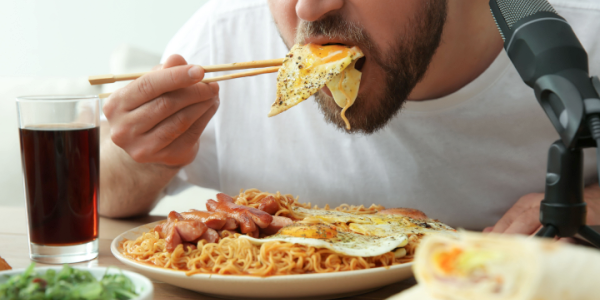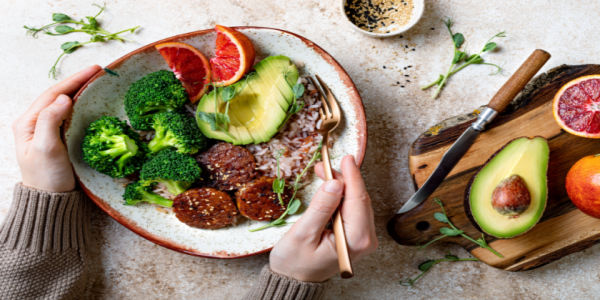
If you’re wondering what mukbang possibly is, you aren’t the only one. Even though this viral eating trend has been around for over a decade, it still has scientists, psychologists, and casual viewers asking questions, such as “Why do people watch mukbang?” and “Is mukbang dangerous?”
Health and nutrition experts also want to know if mukbang weight gain is a problem since it’s an activity that can involve eating excessive amounts of food in front of an audience. Read on to receive answers about this interesting internet trend, along with tips on ways to engage with this growing craze safely.
What Is Mukbang?
Cultures all over the world have their own unique way of sharing meals. However, an unfamiliar trend that originated in South Korea has taken the world by storm recently—AKA mukbang. It’s been traced back to the late 2000s in Korea and gained a more massive presence after being shared with American audiences in the mid-2010s.
The word “mukbang” combines two Korean words that help to describe the phenomenon. It’s a shortened, combined version of the words “meokneun” and “bangsong,” which basically means a sort of “eating broadcast” similar to how brunch is a blend of the words breakfast and lunch. Basically, mukbang features a person who eats food in front of a camera.
Mukbang videos involve the mukbang host—sometimes called a “mukbanger” or “broadcast jockey,” the audience or viewer, and plenty of food. Essentially, a camera is used to record or livestream eating shows people watch or rewatch at a later date.
Although available on various social media platforms, YouTube videos are a particularly popular way for viewers to interact with this trend through “likes,” comments, and sharing features. Mukbang followers have even been described as a type of subgroup or subculture within the Youtube community, and diving into its intricacies may explain why.
Why Do People Watch Mukbang?
As with any behavior, mukbang watchers have a unique set of motives or reasons that bring them to view the videos, such as:
• Coping with stress
• Connecting with community
• Eating reasons (such as altering preferences, habits, etc.)
• Entertainment
• Escaping social isolation
• Overcoming alienation
• Social reasons
Mostly notably, researchers suggest viewers interact with mukbang as a sort of solution for loneliness. With the number of solo eaters increasing, it makes sense why mukbang would appeal to lonely individuals as a vicarious, video form of the communal eating experience.
On the other hand, some psychologists suggest mukbang may have a darker side. It’s believed that vulnerable viewers may obsessively watch mukbang to fill some sort of unmet need. And studies on social media and video games can confirm that problematic use can have destructive consequences.
Is Mukbang Dangerous?
Mukbang’s potential effects are multifaceted, especially when you factor in the complicated relationship between the host and the viewer. From the mental toll to emotional entanglements to the physical dangers of overeating, there are a few particular risks to be aware of.
Can Be a Poor Coping Mechanism
As mentioned above, some internet users may interact with the mukbang trend as a way to fill a void in their lives, as a coping mechanism of sorts. Viewing the behavior through this lens, it’s easy to see how uncontrolled interactions with mukbang media may take over, and how daily use can interfere with daily functioning to a dangerous extent.
In other words, obsessively consuming mukbang content may have the potential to become an addiction akin to video games or online gambling. Although it can be initially entertaining, it carries a risk for worsening mental health. This seems to be especially true of young audiences who grow up with mukbang’s as a natural occurrence on their social media feeds.
May Popularize Poor Manners
While some broadcast jockeys engage in normal eating behaviors, some eat in disturbing or unhealthy ways often described as “bad table manners.”
Some of the more negatively connotated words and phrases used to describe the mukbang experience include:
• Chomping
• Disgusting
• Extreme
• Gluttonous
• Gorging
• Horrifying
• Messy
• Shameful
• Slurping
In some cases, these perceptions are subjective or a matter of opinion. However, they do hold an element of truth. With a growing body of research suggesting it’s good to slow down and mindfully chew each bite, fast-eating mukbang hosts may promote troublesome table habits.
Brings Attention to Hosts with Hidden Motives
Today, ad revenue can make up most of a mukbang streamer’s income. This can influence what they eat and the message they are relaying, especially since popular hosts may promote products they don’t actually eat regularly or truly enjoy.
Since the camera separates the host from the audience, it’s easy for hosts to get desensitized to the fact that they are recommending nutritionally poor food to viewers who may impulse purchase those same products for consumption.
Sometimes, viewers may mistakenly equate the credibility of a certain streamer with the perceived value or nutrition of a food.
Could Encourage Eating Disorders
Some mukbang hosts normalize unhealthy eating behaviors. Like any sort of media, mukbang videos show a highlight or a small portion of the host’s life.
Thin hosts may be participating in disordered eating outside of taping, healthy hosts may be participating in supportive behaviors—like exercise or an otherwise well-balanced diet—that aren’t being shared, and larger hosts may hide troubling symptoms to appease and entertain their audience. Remember, the camera doesn’t always show real life.
Since hosts often eat an excessive amount of food in one sitting, research looking into mukbang suggests that it may promote binge eating. This can be doubly dangerous— it can enable overeaters to continue overeating (to the point of overweight or obesity), and those who aren’t eating enough to live vicariously through those who are eating more than enough.
Basically, mukbang can enforce extreme eating behaviors on both sides of the spectrum.
Can Mukbang Watching Be Healthy?
Mukbang risks exist, but so do potential benefits! Broadcasting an eating experience benefits some viewers, especially those longing for connection, culture, or calm.
May Offer Social Connection
The social setting of mukbang may be an opportunity to connect with like-minded viewers. One study even calls it “a new form of social eating.” While overuse may be problematic, appropriate use may provide connection and fulfill an important social need for many people.
For some individuals, mukbang has the power to become a positive coping pattern instead of a negative one. Many people, especially young viewers, share their meals with a mukbang video. As one publication aptly stated, “many young Koreans consider mukbang as their new eating mate.”
Can Provide Cultural Exposure
Since mukbang has made it worldwide, it can be a fun way to connect with other cultures. Eating styles vary from country to country, and mukbang-style videos can be an exciting way to learn about eating habits in different parts of the world.
Captures ASMR
Autonomous sensory meridian response (ASMR) is a curious phenomenon that’s made its way into mainstream media in recent years. Basically, it’s a pleasant body sensation in response to audio-visual stimuli, usually felt at the crown of the head.
ASMR is typically described as a sort of tingling sensation triggered by watching a video and hearing heightened sounds. In particular, complex sounds with a lower pitch (like a whisper) are thought to be effective, while noises like background music dampen the response.
Confused? ASMR is a bit of a complex sensation to describe, but it’s similar to getting goosebumps when excited or happy. Some experts even describe it as a type of meditative state that creates a pleasant escape from difficult realities, boredom, and stress by creating a sense of happiness and relief.
So, what does mukbang have to do with ASMR? Some hosts use special microphones to pick up eating-related noises like chewing, slurping, and cutting food.
For reasons known (and some still unknown), this can be a calming experience for viewers to be involved in. Related to the reasons above, it may welcome normal background noise for individuals eating or cooking alone.
Health Tips for Watching Mukbang
Want to watch mukbang? Here are some tips for interacting with the trend in a truly healthy way.
Check-In Before Logging In
How’s your mental health? Asking yourself this question each time before you log in may help to protect your headspace. It may be wise not to participate in mukbang on a “bad” mental health day.
Don’t Watch While You’re Eating
Mindless eating may worsen when you’re watching TV or scrolling through social media as you eat. Plus, it’s easier to overindulge or overeat when you’re watching a video of someone doing just that.
Especially if you’re eating foods alongside your video host, it’s important to keep portion control in mind.
Seek Out Healthy Hosts
Hosts eating “regular” food may be a better influence than those indulging daily in unhealthy options. Although these hosts may not seem as entertaining as those eating outrageous amounts or types of food, think of the host as a real-life person you’re inviting to eat with you at your table.
Think of who you’d rather invite: a friend who can help you make healthy eating decisions OR someone who might endager your level of wellness?
Final Food for Thought on the Meaning of Mukbang
With both benefits and risks backed by research, it’s important to understand the effect mukbang watching might have on you as an individual. Fortunately, there is a healthy way to engage with the trend, although especially vulnerable users and youth may be better off mediating their mukbang media use.
All along the way, it’s important to examine your motives and to make sure viewing mukbang aligns with the practices you find most valuable in your life. As with other potentially harmful eating behaviors, reach out to a qualified healthcare provider—like an eating disorder specialist or dietitian—if you feel as though your mukbang obsession is negatively impacting your life and level of wellness.







